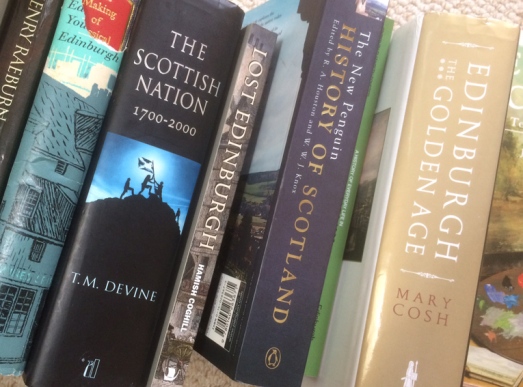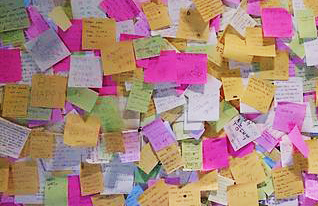
Some of the many books I’ve read as part of my research for this novel.
A few weeks ago I wrote the magic words THE END to my latest novel, and since then I’ve been tackling my edits. In the central section, I found I’d got the time line really twisted, and that took some untangling. I spotted passages that were most definitely ‘telling’ rather than ‘showing’. Redrafting these passages is a treat, because by using the active tense and lively words, and writing a scene as dialogue and interaction rather than description, you can make your writing spring into life.
I have also pondered the comments of the kind souls who volunteered to read my work for me. These were really helpful – and even if I eventually decided not to make a change, at least I was forced to think about what I had written and justify my treatment to myself.
But I also discovered there was something else I needed to do. This is a historical novel, set in the late 18th century. I’ve done a stack of reading, boned up on the period, the setting, fashion, language, homes, habits, even funerals and sanitation. This particular novel, however, hinges around a bit of a mystery – a real one – and it wasn’t until I got to the end that I realised that readers may not even be aware that there is a mystery!
I needed to give some background and context.

Notes! via ProjectManhattan, Wikimedia Commons
In my contemporary novels, I wrote about a fictional town in East Lothian called Hailesbank, and I decided to give it its own history, which I inserted into the beginning of every book. Not having written a historical before, I hadn’t considered adding Author’s Notes – but they are definitely needed here.
So what should I include? Here’s what I decided.
- Background information. What is actually known, what has been widely assumed – and what don’t we know? Many people will think they know the answer, and I definitely need to flag up that there are doubts about the facts of the issue.
- What I discovered when doing the research. In this case, many things – but one or two bits of information I came across really helped to shape the story. For example, my heroine is from a comfortably-off family (father a lawyer, mother has brought further wealth to the marriage). She has never had to think about money – until the French declare war on Britain in 1783 and the banks go into meltdown. The financial crisis also hits other characters in the book.
- Did I have to make compromises in the telling of my story? Did I have to manipulate dates, have characters meet who would probably never have met, and so on.
- Medical facts. My heroine has an unfortunate problem. I might discuss what was known about it at the time, and the effects it would have had on her and others in the same position.
- Fact or fiction? My heroine is fictional, but her best friend was real. However, she didn’t go to the school I sent the two of them to – it didn’t exist! But the conditions described are detailed in a contemporary account.
- Real people? I’ll definitely tell readers which of my figures come from history and which characters I have invented.
My aim is to add to the reader’s understanding of the period and the issues, and enhance their experience of reading the book.
Do you read Author’s Notes, particularly in historical novels? And if so, do you think they add to your experience, or detract from it?

Hi Jenny, I believe author’s notes are vital particularly to clarify the real and imagined, but I feel they should be as brief as possible. I Put them at the end – so as not to spoil the story 🙂 but I put a character list specifying which characters are real and which fictional at the front. I do also have in my first book a brief historical note at the front giving the historical context. (I’ve kept both Historical note and Author note to less than one page.
LikeLike
I always read Authors’ Notes (and Acknowledgements and everything) – I think I prefer to have the Notes at the beginning. Look forward to reading your new book, Jenny.
LikeLiked by 1 person
Ah – the beginning… not sure where I’ll put mine, there’s a key fact in them, but I can’t make up my mind whether the beginning or the end would be better!
Thanks, Kate.
LikeLike
It’s rare that historical notes don’t contain plot spoilers. For this reason they are usually best left to the end.
LikeLiked by 1 person
I think they’re great, sometimes even essential to see where the novelist is ‘coming from’ if there’s an unusual aspect to the events in historical novels but they can add clarity in other genres as well. So long as they’re not too long since they can be skipped past in haste to begin the novel. I’m never sure if they’re best at the end either because the reader will have already gleaned a lot by then.
LikeLiked by 1 person
Beginning or end – it is a dilemma! I’m not at all sure which will be best in this case, but readers can always refer to the end, as Joan suggested (below) if they’re puzzled or wish to know more. Being an impatient soul myself, I like to get right into things!
Thanks for commenting.
LikeLike
I always read author’s notes, Jenny, whether it’s a historical novel or not. My thoughts, for what they’re worth, is that anything that’s interesting, educational, adds depth to understanding the setting and/or characters is worth reading. A useful post.
LikeLiked by 1 person
Thanks for being so reassuring, Rae. I have plenty to say on the subject of my novel – there’s a danger it could take over!! 🙂
LikeLike
I always write author’s notes and read them in other peoples’ books. They are essential if you’ve deliberately changed historical facts and don’t want people to accuse you of ignorance or carelessness. How detailed they are is up to you. Walter Scott wrote notes that are practically novellas in themselves, but well worth reading. Nowadays, most writers would be more concise. A list of published non-fiction that helps with the background is not unusual.
In one of my books I have a list of characters at the beginning, separating the fictional from the real. It only really worked for one, but it was useful there. I’ve seen other writers use this approach.
LikeLiked by 1 person
That’s interesting, Tom, thank you. I might think about a list of characters at the front, but I have a couple of other things there too, so it might become a little cluttered. I’m not sure about length – so far I’ve done it as a Q&A, but that’s easily changed, and no doubt an editor would have views on the best approach, and whether I’ve missed anything.
I had wondered about a simplified bibliography. It’s certainly a possibility.
Thanks for visiting!
LikeLike
An interesting post, Jenny. I read some historicals and would be tempted to read an author’s notes in mid story if I come across something that puzzles me. If I’ve enjoyed the book, I read the notes – to prolong the pleasure. If I was relieved to reach the end, I might not bother.
LikeLiked by 1 person
Relieved to reach the end? Oh, I do hope not!! Thanks for dropping by, Joan. 🙂
LikeLike
I think it all depends on the historical period and if there is an author’s note it should be short and pertinent to the story. I’m currently reading S.J.Parris ‘Heresy’ set in 1583 and although her main character is fictional, one of the other prominent characters is Sir Philip Sidney. It works very well. I look forward to reading yours,Jenny!
LikeLiked by 2 people
My main character is fictional too. It proved an interesting challenge, as I couldn’t make things happen they way I might have liked for her – they had to fit round the main historical characters too! Though sometimes that worked to my advantage, taking the story in unexpected (and interesting) directions. Thanks for visiting, Myra.
LikeLike
I always read author’s notes, Jenny as I’m always curious to know the background to the story, what inspired the author to write it and how they approached it. I also read the acknowledgement. It somehow ties everything together nicely. Very interesting blog, thank you.
LikeLiked by 1 person
I’m really pleased you do, Anne – thanks for responding. I’m getting a lot of encouragement here!
LikeLike
Really interesting post Jenny. I love the sound of this even though I rarely read historical novels. The research must have been fascinating to conduct too. Good luck with it all. Sounds like a winner 😀
LikeLiked by 1 person
I’ll just have to persuade you to read this one, eh? 🙂
LikeLiked by 1 person
Actually Pam was answering for both of us but I do read historicals. Yours sounds fascinating. Can’t wait to read it. Never been brave enough to tackle one though. And yes, I do think Authors Notes are interesting. I’m always curious about what may be true and what might have been fudged a little to fit the story. Thanks for a great post, Jenny. Lorraine.
LikeLiked by 1 person
I read an Author’s Notes, Jenny, because I’m interested in the background and the author’s thought/work process.
This novel is sounding more intriguing each time you mention it – can’t wait for it to come out.
LikeLiked by 1 person
Me too, Mary – need to find a home for it first though! 🙂
LikeLiked by 1 person
I can feel your joy in writing this new departure for you, it’s great Jenny. I read an Author’s notes if I have been fully engaged reading the book. X
LikeLiked by 1 person
That’s great – I guess I’ll have to see if I pass the test … Thanks for commenting.
LikeLike
Ah yes – what happens after the end! It’s interesting, isn’t it? Do you leave things in the air, explain, or leave room for a sequel? In the case of my ‘mystery’, there are still no answers, only questions – more than 200 years on!
LikeLike
This is a really interesting post, Jenny. I’ve only used an author’s note once – in The Christmas Promise. That was to tie up a loose end for the readers, something that happened after the end of the book. I love reading things such as author’s notes and acknowledgements because they add another layer to the book.
LikeLiked by 1 person
Sometimes I read author’s notes! If I *really* liked the book and wonder about how they came up with things.
That’s really exciting that you’re writing a historical fiction. I recently got in to reading those!
LikeLiked by 1 person
I’m so pleased you sometimes read author’s notes, Melissa – and that you’ve taken to historical fiction. It’s a new departure for me, but I’ve loved writing it!!
Thanks for commenting.
LikeLiked by 1 person